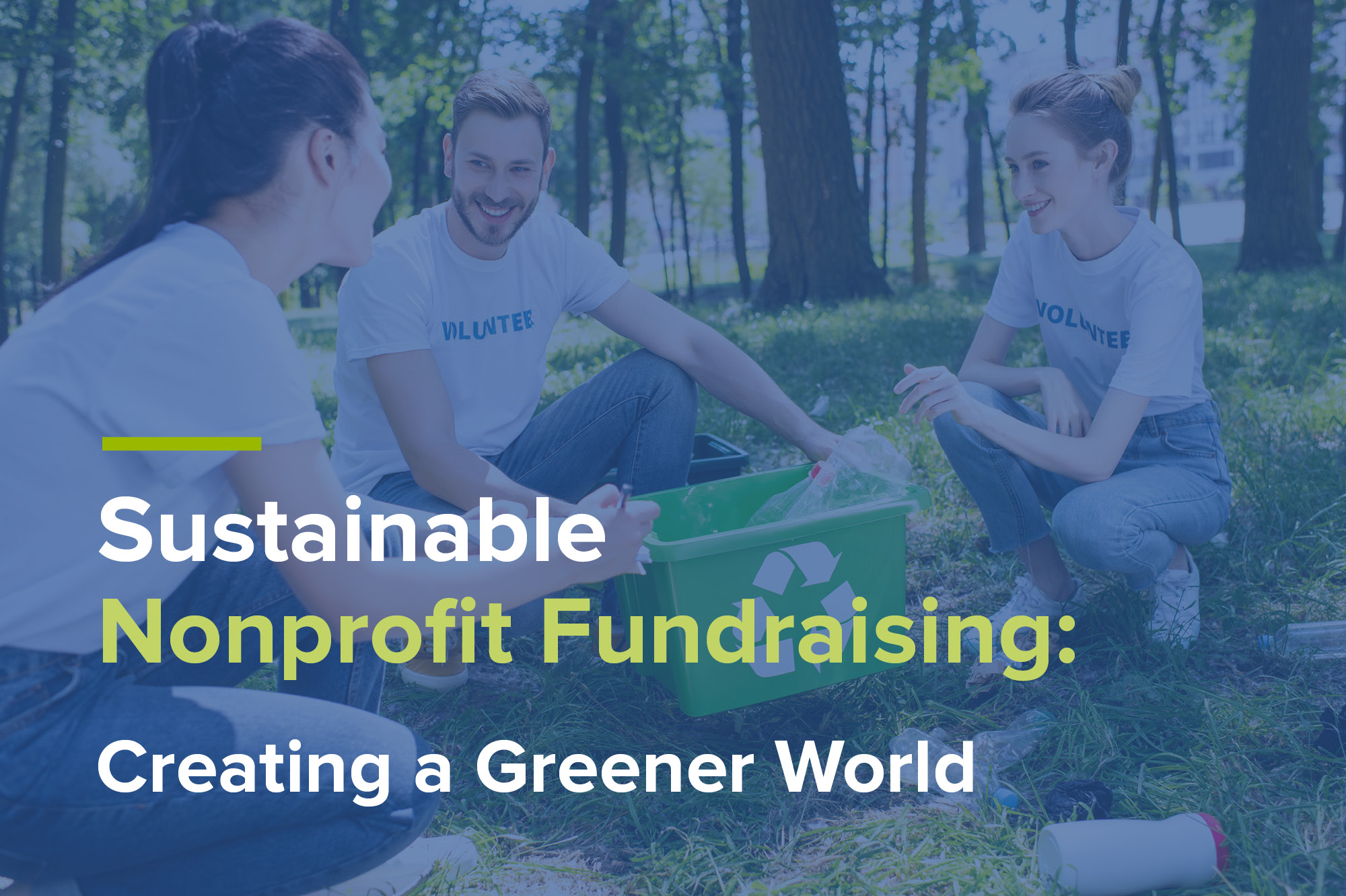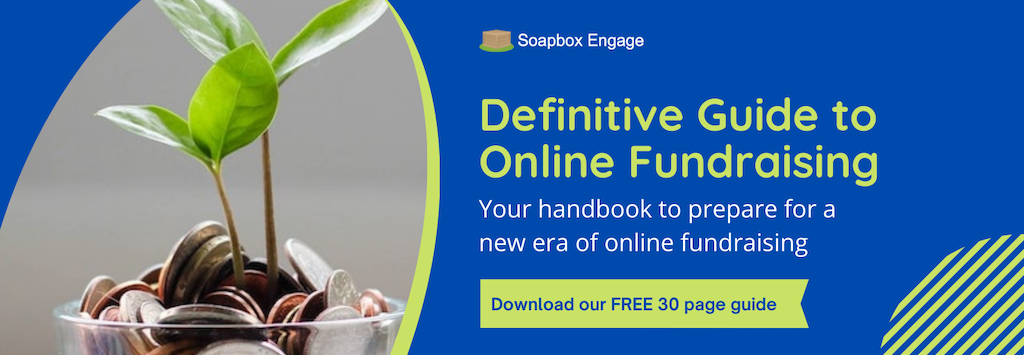
In the world of nonprofit fundraising, there are constant trends cropping up that you have to stay on top of. Current world affairs often inform fundraising trends, such as the development of AI leading to nonprofits using AI tools to support fundraising needs.
A subject that has been on everyone’s minds for a few years now is environmental sustainability. Organizations of all types, from businesses to nonprofits, are centering these concepts by implementing more sustainable practices to create a greener world. Nonprofits, in particular, may want to consider sustainability as an element they evaluate when carrying out a social impact assessment.
In this article, we’ll cover the following sustainable nonprofit fundraising strategies:
- Reduce waste by going digital.
- Encourage in-kind donations.
- Host fundraisers centered on sustainability.
- Partner with environmentally-focused organizations.
More than ever, it’s become obvious that we only have one Earth, and it’s our duty to protect it. We all have a responsibility to keep our planet healthy and ensure that future generations have a place to live. So let’s dive into green practices your nonprofit can implement!
1. Reduce waste by going digital.
It’s estimated that every year, around 12.1 trillion sheets of paper waste are generated by offices, and nearly 1 billion trees worth of paper is thrown away each year. Eliminate paper from your office and reduce your carbon footprint by moving your operations to a digital medium.
You may be thinking: paper is recyclable, so why do I need to change my entire nonprofit’s workflow just to avoid it? In the waste hierarchy, recycling is actually on the lower end of preferred actions. Instead, to better protect the environment, we must prioritize waste prevention—reducing, rather than recycling.
To help your nonprofit reduce waste, consider going digital in the following ways:
- Invest in software solutions. Choose software that addresses the processes in your team’s workflow that generate the most paper waste. For example, if you’re used to filling out financial and tax forms by hand, consider purchasing a nonprofit accounting software solution.
- Implement a work-from-home policy. Commuting creates emissions and greenhouse gases that damage the ozone layer. Consider allowing employees to work virtually from home to be more eco-friendly. As an added bonus, you might improve your employee retention rate by doing so.
- Focus marketing efforts online. Level up your nonprofit marketing efforts and reduce paper waste by focusing them online. Instead of promoting your events and offerings through direct mail, ask supporters if they’d like to opt-in to paperless communications. Instead of relying on flyers and posters, develop your website’s SEO strategy to improve organic traffic.
Running a nonprofit, or any organization, results in a great deal of waste. While completely eliminating waste may be unrealistic, take the time to carefully consider how you can reduce it in your operations. You might be surprised by the easy steps you can take to make a difference for our planet.
2. Encourage in-kind donations.
Nonprofits accept donations of all kinds: one-time, recurring, stock, and planned. However, you can also accept donations that aren’t monetary, also known as in-kind donations. To be more sustainable at your nonprofit, encourage your supporters to donate items and goods they no longer need. For example, if you’re hosting a fundraising event, ask them to donate:
- Tables
- Chairs
- Audio and visual equipment
- Decorations
- Raffle and live auction items
- Venue space
Emphasize to your supporters that in-kind donations help both you and them to be more eco-conscious and sustainable. Empower them to make donations by providing educational decluttering resources. For example, Donate This Recycle That suggests that declutterers should ask three questions when deciding to get rid of an item: Do I need it? Does it make me happy? Do I have room for it? These questions can encourage supporters to donate and help them improve their spaces at the same time.
3. Host fundraisers centered on sustainability.
There are a wide variety of unique fundraisers your nonprofit can organize. However, if you’re serious about your commitment to eco-friendliness, host fundraisers centered on environmental sustainability. Some popular sustainable fundraisers ideas include the following:
- Recycling drive. Ask supporters to collect recyclable items such as cans, bottles, and electronics, and donate them to your nonprofit. Take these items to a recycling center, where you’ll get paid per pound you collect.
- Community cleanup fundraiser. This event functions much like a walk-a-thon, where participants receive pledges or sponsorships for the amount of litter they collect. Not only will you raise funds for your nonprofit’s mission, but you’ll also make a positive impact on the community.
- Clothing sale. Collect gently-used and new clothing from your supporters prior to the event. On the day of, display clothing and allow attendees to purchase any items that suit their fancy. If there’s any clothing left over after the event, bring it to a recycling center to receive more funds.
- Green gala. Host a gala with sustainable decorations, locally-grown food, and compostable dinnerware. You can even include a raffle as an activity, where attendees buy tickets for the chance to win eco-friendly items, such as energy-efficient appliances, reusable water bottles, and organic skincare products.
- Garden party. Encourage supporters to become more in tune with the earth with a garden party. Choose a green space as a venue, such as a community garden or park, and host educational activities on sustainable practices and gardening. Liven the event up with live music and organic food.
- Upcycling workshop. Teach your community the value of upcycling their used items to prevent extra waste. Invite experts and speakers to share their experiences, and sell tickets to attendees to raise funds for your nonprofit.
To make your events even more sustainable, consider hosting fundraisers virtually or in a hybrid format. Not only will this help you attract a greater number of attendees and lower costs, but you’ll also be more eco-friendly, as attendees won’t need to commute and you won’t need to worry about decorating and preparing a large venue.
4. Partner with environmentally-focused organizations.
To demonstrate your commitment to sustainability and creating a greener Earth, partner with environmentally-focused organizations or companies that share similar eco-friendly values. That way, their sponsorships will help make your events more sustainable and you’ll help promote a sustainable business.
Other environmentally-focused organizations to partner with include:
- Sustainable brands
- Environmental nonprofits
- Clean technology companies
- Eco-friendly service providers
- Conservation and wildlife organizations
- Corporate green initiatives
To maximize your chances of landing a sponsorship, take Double the Donation’s corporate sponsorship advice and establish a variety of sponsorship levels, a compelling case for support, and a convenient way for interested companies to reach out. Make sure to mention your nonprofit’s emphasis on eco-friendliness in your sponsorship materials to attract companies whose values align with yours.
It’s easy to put off implementing sustainable practices at your nonprofit—the life of a nonprofit professional is very busy, and there’s always a new challenge popping up that demands your attention. However, we only have one planet, and it’s never too early to focus on protecting it. Even the smallest steps towards eco-friendliness at your nonprofit can make a difference.
